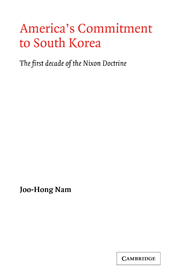1 - THE FOUNDATION OF US SECURITY POLICY IN KOREA
Published online by Cambridge University Press: 07 October 2011
Summary
THE UNITED STATES AS A LIBERATOR
(i) At liberation
The central object of this chapter is twofold: first, to examine the origins of America's involvement in Korean affairs in the post-war era; and secondly, to assess in turn the place of South Korea's security in US global as well as regional strategy in the early Cold War years.
The 1940s were the decade that witnessed the transformation in America's policy from continental isolationism to one of globalism based on vast economic and military capability. America's ability to wage and win a two-front war with Germany to the east and Japan to the west demonstrated the superiority of American power.
It was in the Pacific that the United States had first trod the path to world power. The United States had become a Pacific power in 1898 when it annexed the Philippines, Guam, and Hawaii as the result of the Spanish–American War. The following year, the United States warned the European powers and Russia to keep their hands off China. John Hay's ‘Open Door’ note of September 1899 was the first time that the US has promulgated a general foreign-policy principle outside the Western Hemisphere. American commercial interests in China made the Far East a centre of international rivalry and conflict with other big powers.
- Type
- Chapter
- Information
- America's Commitment to South KoreaThe First Decade of the Nixon Doctrine, pp. 11 - 48Publisher: Cambridge University PressPrint publication year: 1986

